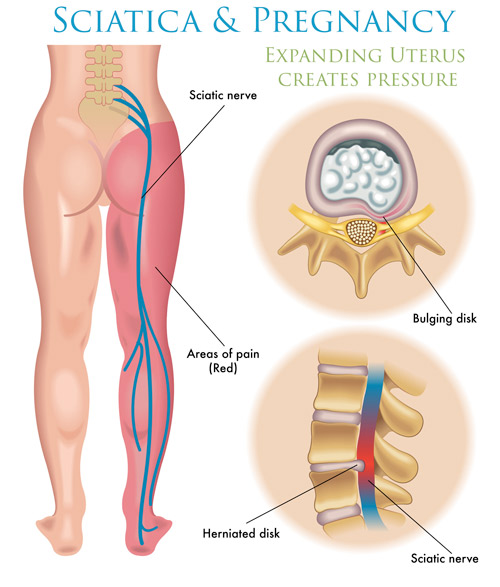
Sciatic Nerve and Pregnancy: Understanding the Causes, Symptoms, and Relief
Pregnancy is a time of profound physical and hormonal changes, which can lead to a variety of discomforts and ailments. One common complaint during pregnancy is sciatic nerve pain, which can range from mild to severe and significantly impact a woman’s quality of life.
What is the Sciatic Nerve?
The sciatic nerve is the longest nerve in the human body, originating from the lower back and running down the back of each leg. It provides sensation and motor control to the buttocks, thighs, calves, and feet.
Causes of Sciatic Nerve Pain in Pregnancy
During pregnancy, several factors can contribute to sciatic nerve pain:
- Hormonal Changes: Pregnancy hormones, such as relaxin, cause the ligaments and joints in the pelvis to loosen, which can alter the alignment of the spine and put pressure on the sciatic nerve.
- Uterine Enlargement: As the uterus grows, it can press against the sciatic nerve, especially when the baby is in a head-down position.
- Weight Gain: The weight gained during pregnancy can put additional pressure on the spine and sciatic nerve.
- Poor Posture: Changes in posture due to the growing belly can also strain the sciatic nerve.
Symptoms of Sciatic Nerve Pain
Sciatic nerve pain typically manifests as a sharp, shooting, or burning sensation that radiates down the back of one or both legs. It can range in severity from mild discomfort to debilitating pain. Other symptoms may include:
- Numbness or tingling in the legs or feet
- Weakness in the legs or feet
- Difficulty walking or standing
- Pain that worsens with sitting, standing, or walking
Diagnosis of Sciatic Nerve Pain
Diagnosing sciatic nerve pain during pregnancy involves a physical examination and a review of the patient’s symptoms. The doctor may also order imaging tests, such as an MRI or X-ray, to rule out other underlying conditions.
Treatment Options
Treatment for sciatic nerve pain during pregnancy focuses on relieving pain and improving mobility. Common treatment options include:
- Physical Therapy: Exercises and stretches can help strengthen the muscles around the spine and improve posture, reducing pressure on the sciatic nerve.
- Chiropractic Care: Spinal adjustments can help align the spine and reduce nerve compression.
- Massage Therapy: Massage can help relax tight muscles and improve blood flow to the affected area.
- Acupuncture: Acupuncture involves inserting thin needles into specific points on the body to stimulate nerve function and reduce pain.
- Over-the-Counter Medications: Acetaminophen or ibuprofen can help relieve mild to moderate pain.
- Prescription Medications: In severe cases, prescription medications, such as muscle relaxants or opioids, may be necessary.
Prevention of Sciatic Nerve Pain
While not all cases of sciatic nerve pain can be prevented, there are some steps pregnant women can take to reduce their risk:
- Maintain a Healthy Weight: Avoid excessive weight gain during pregnancy.
- Practice Good Posture: Stand and sit up straight, and avoid slouching.
- Exercise Regularly: Engage in low-impact exercises, such as walking, swimming, or prenatal yoga.
- Wear Comfortable Shoes: Wear supportive shoes with low heels.
- Use a Pregnancy Pillow: A pregnancy pillow can help support the belly and reduce pressure on the sciatic nerve.
When to Seek Medical Attention
If sciatic nerve pain is severe, persistent, or accompanied by other symptoms, such as fever, chills, or loss of bladder or bowel control, it is important to seek medical attention immediately. These symptoms could indicate a more serious underlying condition, such as a herniated disc or cauda equina syndrome.
Conclusion
Sciatic nerve pain is a common complaint during pregnancy, caused by various factors related to the physical and hormonal changes that occur. While the pain can be significant, there are a range of treatment options available to relieve symptoms and improve mobility. By understanding the causes, symptoms, and treatment options, pregnant women can effectively manage sciatic nerve pain and enjoy a more comfortable pregnancy.